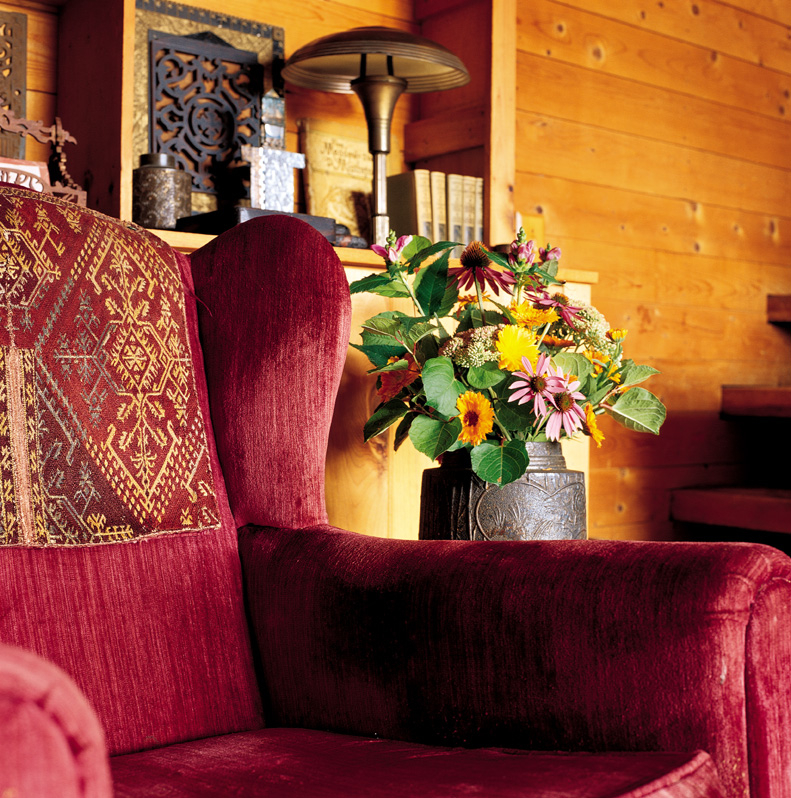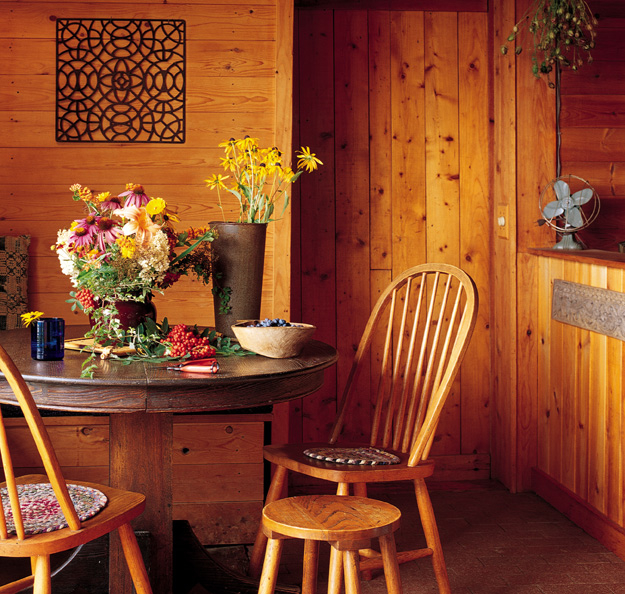On Wabi-Sabi Weekends, I post excerpts from my book, Simply Imperfect: Revisiting the Wabi-Sabi House.
“The voyage of discovery is not in seeking new landscapes but in having new eyes.” —Marcel Proust
I landed at Kate NaDeau’s sweet, rustic stone house on a hillside near Belfast, Maine, while scouting houses and gardens to feature in Natural Home magazine. I had gone to see Kate’s gardens, bountiful with vegetables, flowers and herbs that she sells at the farmers’ market under the moniker Stone Soup Farm, but I couldn’t stop asking about the stone cottage.
Kate and her former husband, both disciples of back-to-the-landers Scott and Helen Nearing, had built the house over the course of five years, she told me. They had placed every stone with their own hands. Kate was clearly proud of her house, but I had to invite myself to see inside. Kate said she didn’t think a magazine editor would appreciate the way she lived. I told her that Natural Home wasn’t just another home décor magazine. Eventually, she let me in.
Kate’s home was charming, appointed with cozy, flea-market furniture and dumpster finds. Her 1930s stove had narrow rust rivulets in its chipped and yellowing enamel, but it worked well enough to accomplish regular meals as well as some heavy canning and preserving. The wooden dining chairs didn’t match, and a wine-colored armchair near the woodstove had seen better days. Herbs and flowers hung drying from beams overhead. I wanted to spend the rest of the afternoon sitting in the sunlight at the kitchen table, helping Kate snap beans. I loved her casual, frugal decorating style; nothing was new, and everything had a story and a reason for being in her home.
I asked about a rusty grate hanging on the wall.
“Oh, that,” she said. “That is so wabi-sabi.”
“Wobby what?”I asked.
She described wabi-sabi as the Japanese art of appreciating things that are imperfect, primitive and incomplete, and she sent me home with a slim volume, Wabi-Sabi for Artists, Designers, Poets & Philosophers, by Leonard Koren—one of the most important gifts I’ve ever received.
Before I even read Koren’s book, I knew I’d been wabi-sabi all my life. This ancient Japanese concept of revering gracefully weathered, rusty things exactly matched my own proclivities. Finally, I would have a word I could use when my mother asked whether I was going to paint those old wooden French doors or replace the 1940s enamel table I worked on instead of a real desk. I delved more deeply and found that décor was wabi-sabi’s surface, one facet of a philosophy that promotes attention, reverence, generosity and respect—the foundation of a happy home.
Wabi-sabi isn’t a “look,” like French country or shabby chic. Intimately tied to Zen Buddhism and the Japanese Way of Tea, it’s a subtly spiritual philosophy that offers a path toward home as sanctuary, a simple place devoid of clutter, disturbance and distraction—including the voices in our heads that attach all sorts of tasks and to-do lists to home.
Wabi-sabi doesn’t suggest we ignore these tasks, but it does say we can pay attention when attention is due and stop worrying about them when we should be enjoying dinner with our families. It focuses on things as they are, right now. Everything in our homes—from the breakfast table to the attic windows—presents an opportunity to see beauty. Wabi-sabi is a lens.

